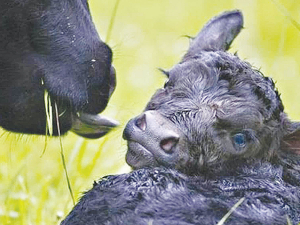Come and chat to the DairyNZ team
DairyNZ's team is looking forward to catching up with Southland and Otago dairy farmers at the Southern Field Days in Waimumu near Gore next month.
 Calves that had a difficult birth or that are born in poor weather are more likely to have trouble standing and suckling.
Calves that had a difficult birth or that are born in poor weather are more likely to have trouble standing and suckling.
Successful calf rearing starts as soon as the calf is born.
DairyNZ urges farmers to ensure that all calves are cared for at all times, including in the paddock and on their way to the calf sheds.
It is also important that farmers look after themselves during calving.
“When moving cows and calves, stay safe and don’t turn your back on a newly calved cow.
“Even cows that are usually placid can become aggressive after calving. Keep the calf between you and the cow and don’t take any dogs or children into the calving paddock.
"When lifting calves, bend your knees and keep your back straight: get assistance if needed.”
Record all births and make sure you know the recording procedures for your farm prior to calving. Record:
■ date
■ cow (dam) tag number
■ sex of the calf
■ alive or dead
■ calf identity/number
■ assisted or unassisted calving.
Check the system used on your farm for matching cows and calves. If in doubt, checking the breeding information can help; is the cow due? When was the mating date? Does the breed match the bull/sire? LIC also offers parentage/DNA testing.
Temporary identification tags can be used for newborn calves in the paddock, e.g. elastic neckbands with tags. Once back in the shed, proper tags can be put on in an environment that is clean and dry. If tagging in the paddock, ensure that the calf’s ear is clean, dry and disinfected.
Calves that had a difficult birth or that are born in poor weather are more likely to have trouble standing and suckling. Identify high risk calves as soon as possible, record their numbers, and bring them to the calf shed to get warm and have a good feed of colostrum.
To prevent navel infection, spray navels of newborn calves in the paddock and on arrival at the shed. Completely spray or dip the navel with iodine. Don’t use teat spray as the glycerine in teat spray can keep navels soft and moist.
Good practice is to pick up newborn calves from the paddock twice daily to bring them to a warm, clean environment and ensure they get enough gold colostrum in the first hours of life.
The trailer used for picking up calves should be cleaned and disinfected regularly. To make transport safer for calves, AstroTurf or another easily cleaned, non-slip material can be used in the bottom of the trailer. Don’t overload the trailer – there should be enough room so that all calves can lie down comfortably. Make two trips if there is not enough room.
Gold Colostrum
Providing the right amount of the best colostrum early in life is the right thing to do for your calves.
Gold colostrum provides energy and health benefits for all calves and is part of world leading animal care.
Calves are born with a non-developed immune system and must absorb antibodies from colostrum until their own immune system becomes functional.
At 24 hours old, the calf gut “closes” and becomes unable to absorb antibodies. Calves that fail to absorb enough antibodies in the first 24 hours are said to have suffered Failure of Passive Transfer (FPT).
Giving your newborn calves the correct amount of high-quality colostrum will help ensure:
■ Less scours and disease
■ Reduced death rates
■ Better growth rates
■ Improved lifetime productivity and fertility.
South Island dairy farmers will soon be able to supply organic milk to Fonterra.
Norwood has announced the opening of a new Tasman dealership at Richmond near Nelson next month.
Buying or building a rural or semi-rural property? Make sure you know where the wastewater goes, says Environment Canterbury.
With collars on more than seven million cows worldwide, Nedap says its standalone launch into New Zealand represents world-leading, reliable and proven smart technology solutions for dairy farmers.
Entries have opened for the 2026 Fieldays Innovation Awards.
Animal welfare is of paramount importance to New Zealand's dairy industry, with consumers increasingly interested in how food is produced, not just the quality of the final product.